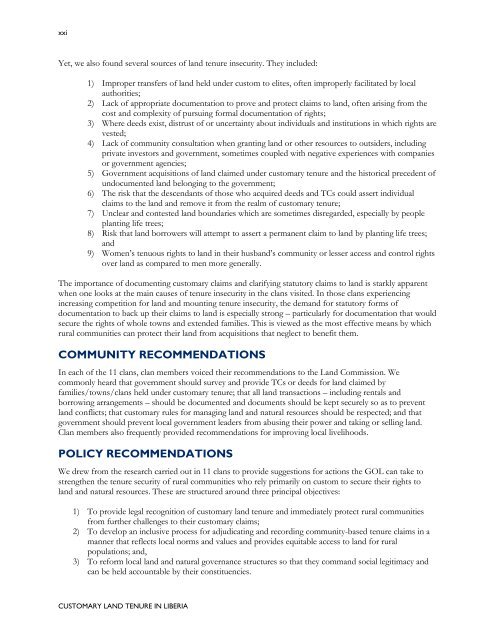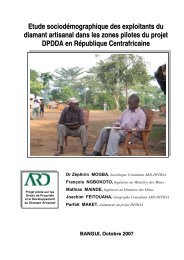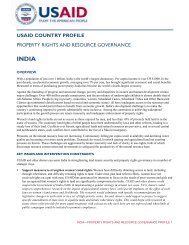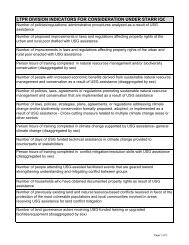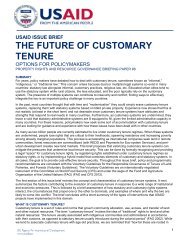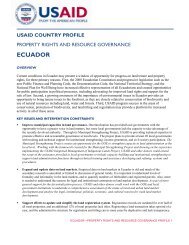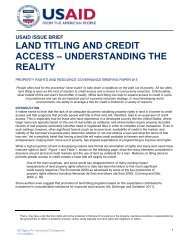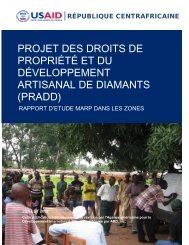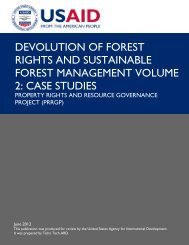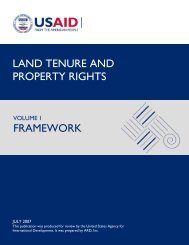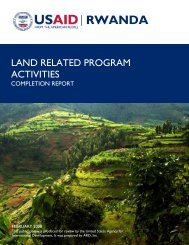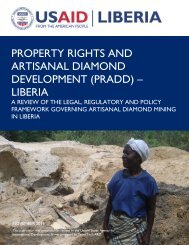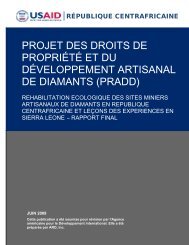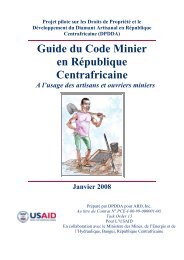Customary Land Tenure in Liberia - Land Tenure and Property ...
Customary Land Tenure in Liberia - Land Tenure and Property ...
Customary Land Tenure in Liberia - Land Tenure and Property ...
Create successful ePaper yourself
Turn your PDF publications into a flip-book with our unique Google optimized e-Paper software.
xxi<br />
Yet, we also found several sources of l<strong>and</strong> tenure <strong>in</strong>security. They <strong>in</strong>cluded:<br />
1) Improper transfers of l<strong>and</strong> held under custom to elites, often improperly facilitated by local<br />
authorities;<br />
2) Lack of appropriate documentation to prove <strong>and</strong> protect claims to l<strong>and</strong>, often aris<strong>in</strong>g from the<br />
cost <strong>and</strong> complexity of pursu<strong>in</strong>g formal documentation of rights;<br />
3) Where deeds exist, distrust of or uncerta<strong>in</strong>ty about <strong>in</strong>dividuals <strong>and</strong> <strong>in</strong>stitutions <strong>in</strong> which rights are<br />
vested;<br />
4) Lack of community consultation when grant<strong>in</strong>g l<strong>and</strong> or other resources to outsiders, <strong>in</strong>clud<strong>in</strong>g<br />
private <strong>in</strong>vestors <strong>and</strong> government, sometimes coupled with negative experiences with companies<br />
or government agencies;<br />
5) Government acquisitions of l<strong>and</strong> claimed under customary tenure <strong>and</strong> the historical precedent of<br />
undocumented l<strong>and</strong> belong<strong>in</strong>g to the government;<br />
6) The risk that the descendants of those who acquired deeds <strong>and</strong> TCs could assert <strong>in</strong>dividual<br />
claims to the l<strong>and</strong> <strong>and</strong> remove it from the realm of customary tenure;<br />
7) Unclear <strong>and</strong> contested l<strong>and</strong> boundaries which are sometimes disregarded, especially by people<br />
plant<strong>in</strong>g life trees;<br />
8) Risk that l<strong>and</strong> borrowers will attempt to assert a permanent claim to l<strong>and</strong> by plant<strong>in</strong>g life trees;<br />
<strong>and</strong><br />
9) Women‟s tenuous rights to l<strong>and</strong> <strong>in</strong> their husb<strong>and</strong>‟s community or lesser access <strong>and</strong> control rights<br />
over l<strong>and</strong> as compared to men more generally.<br />
The importance of document<strong>in</strong>g customary claims <strong>and</strong> clarify<strong>in</strong>g statutory claims to l<strong>and</strong> is starkly apparent<br />
when one looks at the ma<strong>in</strong> causes of tenure <strong>in</strong>security <strong>in</strong> the clans visited. In those clans experienc<strong>in</strong>g<br />
<strong>in</strong>creas<strong>in</strong>g competition for l<strong>and</strong> <strong>and</strong> mount<strong>in</strong>g tenure <strong>in</strong>security, the dem<strong>and</strong> for statutory forms of<br />
documentation to back up their claims to l<strong>and</strong> is especially strong – particularly for documentation that would<br />
secure the rights of whole towns <strong>and</strong> extended families. This is viewed as the most effective means by which<br />
rural communities can protect their l<strong>and</strong> from acquisitions that neglect to benefit them.<br />
COMMUNITY RECOMMENDATIONS<br />
In each of the 11 clans, clan members voiced their recommendations to the <strong>L<strong>and</strong></strong> Commission. We<br />
commonly heard that government should survey <strong>and</strong> provide TCs or deeds for l<strong>and</strong> claimed by<br />
families/towns/clans held under customary tenure; that all l<strong>and</strong> transactions – <strong>in</strong>clud<strong>in</strong>g rentals <strong>and</strong><br />
borrow<strong>in</strong>g arrangements – should be documented <strong>and</strong> documents should be kept securely so as to prevent<br />
l<strong>and</strong> conflicts; that customary rules for manag<strong>in</strong>g l<strong>and</strong> <strong>and</strong> natural resources should be respected; <strong>and</strong> that<br />
government should prevent local government leaders from abus<strong>in</strong>g their power <strong>and</strong> tak<strong>in</strong>g or sell<strong>in</strong>g l<strong>and</strong>.<br />
Clan members also frequently provided recommendations for improv<strong>in</strong>g local livelihoods.<br />
POLICY RECOMMENDATIONS<br />
We drew from the research carried out <strong>in</strong> 11 clans to provide suggestions for actions the GOL can take to<br />
strengthen the tenure security of rural communities who rely primarily on custom to secure their rights to<br />
l<strong>and</strong> <strong>and</strong> natural resources. These are structured around three pr<strong>in</strong>cipal objectives:<br />
1) To provide legal recognition of customary l<strong>and</strong> tenure <strong>and</strong> immediately protect rural communities<br />
from further challenges to their customary claims;<br />
2) To develop an <strong>in</strong>clusive process for adjudicat<strong>in</strong>g <strong>and</strong> record<strong>in</strong>g community-based tenure claims <strong>in</strong> a<br />
manner that reflects local norms <strong>and</strong> values <strong>and</strong> provides equitable access to l<strong>and</strong> for rural<br />
populations; <strong>and</strong>,<br />
3) To reform local l<strong>and</strong> <strong>and</strong> natural governance structures so that they comm<strong>and</strong> social legitimacy <strong>and</strong><br />
can be held accountable by their constituencies.<br />
CUSTOMARY LAND TENURE IN LIBERIA


